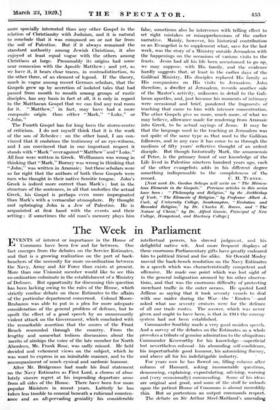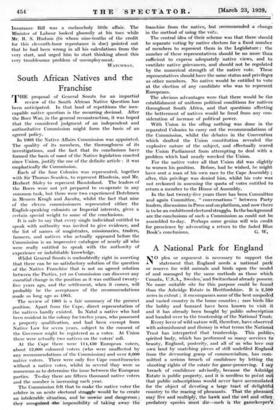The Week in Parliament
EVENTS of interest or importance in the House of 1'4 Commons have been few and far between. One fact emerges from the debates on the Service Estimates, and that is a growing realization on the part of back- benchers of the necessity for more co-ordination between the Navy, Army and Air Force than exists at present. More than one Unionist member would like to see this co-ordination culminate in the establishment of a Ministry of Defence. But opportunity for discussing this question has been lacking owing to the rules of the House, which strictly confine debate on these Estimates to the affairs of the particular department concerned. Colonel Moore- Brabazon was able to put in a plea for more adequate consideration of the general problem of defence, but he spoilt the effect of a good speech by an unnecessarily violent attack on the Government, which concluded with the remarkable assertion that the snores of the Front Bench resounded through the country. From the lengthy and somewhat tedious discussions about the merits of airships the voice of the late member for North :Aberdeen, Mr. Frank Rose, was sadly missed. He held decided and vehement views on the subject, which he was wont to express in an inimitable manner, and to the accompaniment of much cynical and sardonic humour.
After Mr. Bridgeman had made his final statement on the Navy Estimates as First Lord, a chorus of abso- lutely, sincere regret at his impending departure arose from all sides of the House. There have been few more popular Ministers in recent years. Latterly he has taken less trouble to conceal beneath a rubicund counten- ance and an all-pervading geniality his considerable intellectual powers, his shrewd judgment, and his delightful native wit. And more frequent displays of these enormous Parliamentary gifts have greatly endeared him to political friend and foe alike. Sir Oswald Mosley moved the back-bench resolution on the Navy Estimates in a speech which was characteristically competent and offensive. He made one point which was lost sight of in the general indignation aroused by his other observa- tions, and that was the enormous difficulty of protecting merchant traffic in the outer oceans. He quoted Lord Jellicoe as saying that it took seventy vessels to deal with one raider during the War—the ' Emden '—and asked what use seventy cruisers were for the defence of all our trade routes. The answer, which was never given and ought to have been, is that in 1914 the convoy system had not been established.
Commander Southby made a very good maiden speech.
And a survey of the debates on the Estimates as a whole provokes a tribute of genuine admiration to the ubiquitous Commander Kenworthy for his knowledge—superficial but nevertheless colossal—his abounding self-confidence, his imperturbable good humour, his astonishing fluency, and above all for his indefatigable industry.
For years now he has flowed on, filling column after column of Hansard, asking innumerable questions, denouncing, explaining, expostulating, advising, warning and (very occasionally) commending. Some of his ideas are original and good, and some of the stuff he unloads upon the patient House of Commons is almost incredibly thin. But so' portentous an output commands respect. The debate on Sir Arthur Steel-Maitland's amending Insurance Bill was a melancholy little affair. The Minister of Labour looked gloomily at his toes while Mr. R. S.- Hudson (t6 whom nine-tenths of the credit for this eleventh-hour repentance is due) pointed out that he had been wrong in all his calculations from the very start, and urged him to start thinking about this very troublesome problem of uneMployment.
WATCHMAN.

















































 Previous page
Previous page